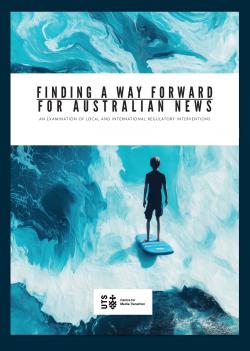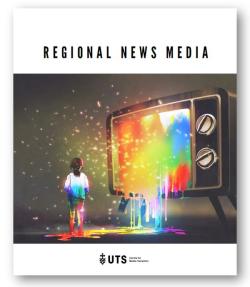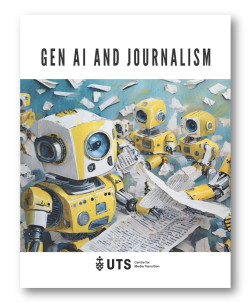
Research Reports
Click on the titles to download the reports and submissions.
GenAI and Journalism: Towards Common Principles

Three years after OpenAI’s ChatGPT launch saw generative artificial intelligence (AI) threatening to become yet another major disruptor to the journalism industry, it remains neither its saviour nor its downfall. In Australia the journalism sector is still struggling to survive. Trust remains on a downward trajectory. And moreover, the known challenges of generative AI remain virtually unchanged – including those of bias, verification and hallucination. This report examines key global developments in generative AI since our first report in 2023 and explores its ongoing impact on public interest journalism, with a focus on guideline development in Australia and globally. It presents the views of Australian newsrooms and the state of play.

Australia’s News Media Bargaining Code prompted digital platforms to reach commercial agreements to support the production of news. But as the first cycle of agreements concluded and Meta threatened to withdraw news from Facebook in Australia, there was a need to explore new mechanisms to support the production of news. This report examines two alternative approaches: measures to fund financial sustainability of news through industry levies or similar measures, and provisions to ensure continued presence and accessibility for news content or services such as “must-carry”, “must-be-discoverable” or “must not deprioritise” provisions. The report sets out a series of elements that could be considered as part of a package of reforms embracing both these elements to support media sustainability.

Regional News Media 2024 | In our final report we have gone global in search of answers to how best to provide regional media with the resources it needs to produce quality public interest journalism, and, with that journalism, to establish links to metropolitan media, so that all Australians have a sense of what the significant issues facing regional dwellers are and how they can best be tackled by policy-makers

GenAI and Journalism - the CMT has conducted a widescale investigation of the attitudes towards generative AI in news production and steps being undertaken by Australian newsrooms to prepare for its possible deployment. The results indicate that newsrooms are experimenting cautiously with the technology. They see strong upside for news production, particularly around the absorption of menial tasks that have arisen with digitalisation, and an opportunity for trusted brands, conditional on maintaining robust editorial processes. However, editors are attuned to the significant downside of generative AI use if accuracy, authenticity and bias are not adequately dealt with. Transparency and human oversight are critical. Newsrooms are also concerned about the use of their news archives to train AI systems without recompense. Efforts at regulating AI are gathering pace around the world. These mostly focus on transparency and safety-testing obligations for AI systems and regulating high-risk uses. Promoting quality news and information will be essential in an increasingly polluted information environment.
Regional News Media | 2023 - In the 2nd of our regional media reports, CMT has been examining the flow of narratives between metro and regional news media on important policy discussions. The two policy areas we examined were the Murray-Darling Water Plan and the legislated alcohol bans on Indigenous communities in the Northern Territory – both policy areas which impact metro audiences. We have also repeated our survey of the levels of coverage of regional issues in metro media outlets and examined regional media start-ups to enquire about the challenges and opportunities. Finally, we continue our annual examination of the impact of the Guardian Australia Rural Reporting Network established under this program of research.
Information Disorder: Lessons from Australia - This report provides definitions that explain the nuances of a polluted information space, because precise language is crucial to help us understand the problems we are facing, particularly as technology and social media evolve. It offers an overview of the mis- and disinformation landscape in Australia by covering the dominating trends and narratives in the past few years in several key areas including, the Covid- 19 Pandemic, Federal Election and Climate. The report notes the progress Australian regulators and those abroad, industry associations and civil society organisations have made in the past years on tackling the rampant mis- and disinformation on social media. The development and effectiveness of different industry interventions, one of the most common methods being fact-checking, is also discussed. The report ends with recommendations for policymakers, news media and academics specific to the Australian landscape in the hope of cutting down harmful information that has a direct impact on people's lives, health and safety. These will also serve as lessons for other countries facing similar issues.
Regional News Media - This Regional News Media report is the first of three over as many years investigating the impact of contraction of regional media in New South Wales on metro coverage of news and issues significant to Australia which originate in non-urban areas. In the first years, based on a quantitative study of regional issues covered by metro outlets, including print, radio and television, the centre has found mixed levels of coverage, with some having higher local coverage than others, including the ABC which has a larg regional presence. The report has also found the largest subjects of coverage by metro outlets were court and crime stories, followed by local government and national sport; very few stories focused on arts and culture, science, and social issues and none concerned indigenous issues. Significantly, the report found the majority of stories covered in metro outlets originated as responsive reportage to outside events and were not the result of the outlets own effort. Editors uniformly cited the difficulty of finding freelance reporters and of recruiting journalists to regional locations. However, the report also found in research interviews conducted with regional audiences that there is strong agreement that representation in metro media is important but that metro media often does not meet audience expectations because it sensationalises, misinterprets and misrepresents facts on the ground.
Is it possible to establish a scheme or body to hear escalated complaints about digital platforms? This research responds to a proposal from the ACCC in the Final Report of the Digital Platforms Inquiry for the creation of a Digital Platform Ombudsman, including the idea of expanding the Telecommunications Industry Ombudsman (TIO). Focussing on social media, this report looks at the types of complaints made, how they are handled, and options for external dispute resolution. It identifies obstacles in the development of a comprehensive ombudsman service and describes some alternative arrangements that could accompany an enhanced role for the TIO.
As part of the ACMA research program 2019–20, the Centre for Media Transition was commissioned to conduct a review of literature and research to provide a comprehensive understanding at that point in time of the media environment in relation to four key issues in relation to news: commercialisation, impartiality, diversity and localism.
News in Australia: Diversity and localism_Review of literature and research - This report covers the topics of diversity and localism. This includes an exploration of how it can be measured over time across the variety of news sources being consumed.
News in Australia: Impartiality and commercial influence_Review of literature and research – This report explores current attitudes to news, changing consumption patterns and consumer concerns about impartiality and commercial influence in news in Australia.
The Consent Trap - Australian focus groups on smart phones, privacy and consent - Six workshops were held in 2020 and desk-based research undertaken to identify a "sweet spot" for notice-and-consent provisions on smartphones. This report by CMT postdoctoral research fellow Sacha Molitorisz and RMIT senior lecturer James Meese shares findings on consumer experiences of informed consent regarding privacy on smartphone devices with the aim to help develop practical resources for privacy professionals who deal with the problem of informed consent on mobile devices.
News media Innovation 2020 - Researcher Jacqui Park mapped the media start-up and innovation eco-system in Australia, New Zealand and the broader Asia Region. In the report, we draw insights and questions about innovation across the four pillars of product development, business models, distribution and the journalism that lies at the heart of news media in a democratic society. We look at how these can be integrated with strategies that understand and engage audiences at the centre of the process.
Regional News - state of play - Publishers and Editors were surveyed on the state of regional and local news media. This report is about the results of that survey and has previously unpublished research into news consumption in regional areas and a review of relevant literature. It explores the impact of digital disruption on the news media ecosystem in regional Australia.
Crisis, challenge and choice in regional and local news media: The case for a service-first recovery - This report brought together three strands of work, which comprised of a review of key texts in the literature and collation of resources on the state of news in regional Australia; an initial opinion survey of regional news consumers’ attitudes to media; and a brief case study-based review of local and regional news media innovation in other countries.
Public Trust in Journalism: An Annotated Bibliography - An assessment of the body of knowledge on the current state of trust in news media, reviewing existing research, primarily empirical studies of journalism and trust, and including secondary research appearing in scholarly journals and other sources.
Trust and news media in Australia: a qualitative study - Part of the Public Trust in Journalism research project that was kicked off with the release of the (above) annotated bibliography. After, workshops were held that interrogated the way people use and trust media. These workshops in Tamworth and Sydney in May 2018, asked three key questions. First, which news sources do participants use and trust? Second, why do they use and trust those sources? And third, building on the answers to those questions, is it possible to design a news source that users are more likely to trust? The results of the workshops are discussed in our report.
The Impact of Digital Platforms on News and Journalistic Content - This report was commissioned by the Australian Competition and Consumer Commission (ACCC) as an input to the Digital Platforms Inquiry. The Centre was asked by the ACCC to research and report on four broad themes of relevance to the Inquiry relating specifically to news and journalistic content: (1) The characteristics of this content and its public function in democratic society; (2) Choice, including production and distribution as well as diversity; (3) Consumption, including access and specific practices such as customisation and (4) Quality, including any changes in quality in the contemporary environment.
Trends in Digital Defamation: Defendants, Plaintiffs, Platforms - The Centre for Media Transition has reviewed plaintiffs, defendants and platforms in a new report on five years of defamation cases from 2013 to 2017. The study shows the landscape for legal disputes around reputation is changing, as the question ‘who is a publisher’ continues to evolve. It highlights the growing influence of social platforms and websites not affiliated with media companies as the source of legal disputes.

